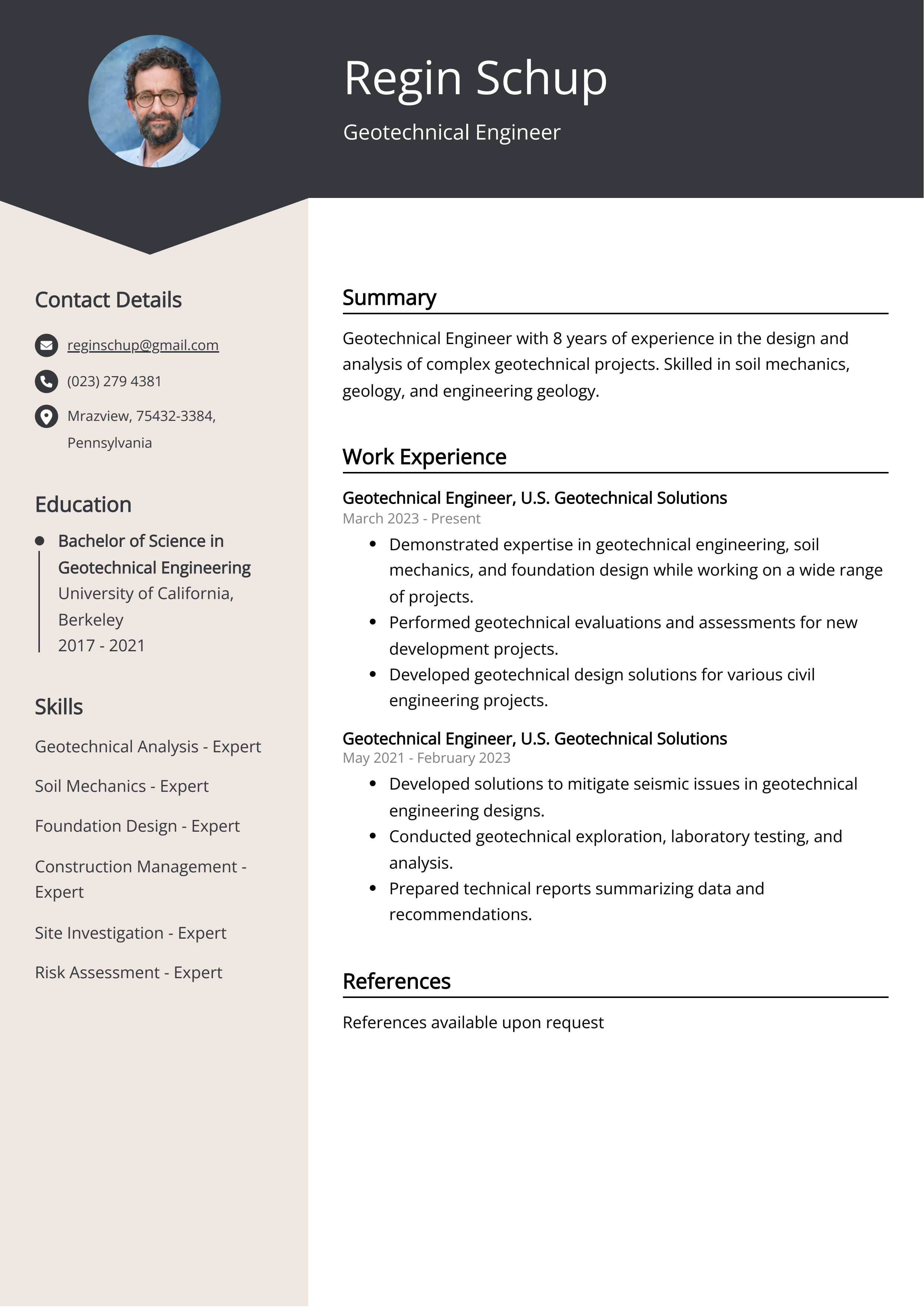Some Ideas on Geotheta You Need To Know
Some Ideas on Geotheta You Need To Know
Blog Article
Not known Incorrect Statements About Geotheta
Table of ContentsGeotheta Can Be Fun For EveryoneGeotheta Can Be Fun For AnyoneSee This Report about GeothetaHow Geotheta can Save You Time, Stress, and Money.What Does Geotheta Mean?

They carry out website examinations, gather examples, do lab examinations, and assess data to assess the suitability of the ground for building tasks - Tailings Engineer. Based upon their searchings for, geotechnical engineers provide referrals for foundation layout, incline security, keeping structures, and mitigation of geotechnical risks. They work together with other experts, such as engineers, architectural engineers, and building teams, to ensure that geotechnical considerations are integrated into the overall task design and execution
By evaluating the behavior and residential or commercial properties of soil and rock, they can recognize possible geotechnical threats such as landslides, soil settlement, or slope instability. Their know-how aids protect against failings or accidents that can threaten lives and home. Below are some detailed duties and obligations of a geotechnical engineer: Website Examination: Geotechnical designers conduct site investigations to gather information on subsurface conditions.
They interpret the information to comprehend the residential properties and behavior of the soil and rock, including their toughness, permeability, compaction qualities, and groundwater conditions. Geotechnical Evaluation and Layout: Geotechnical engineers analyze the data gathered throughout site examinations to evaluate the stability and viability of the site for building projects. They carry out geotechnical estimations and modeling to examine variables such as bearing capability, negotiation, slope stability, side earth pressures, and groundwater flow.
Everything about Geotheta
Structure Layout: Geotechnical engineers play a crucial function in creating structures that can securely sustain the intended framework. They assess the dirt problems and load needs to figure out the appropriate foundation kind, such as shallow foundations (e.g., grounds), deep structures (e.g (https://ameblo.jp/geotheta/entry-12862281966.html)., stacks), or specialized methods like dirt renovation. They take into consideration elements such as settlement restrictions, birthing capacity, and soil-structure communication to establish optimal structure styles
They examine building plans, screen website tasks, and conduct area inspections to confirm that the design suggestions are complied with. If unforeseen geotechnical issues arise, they evaluate the situation and supply referrals for removal or modifications to the style. Risk Assessment and Mitigation: Geotechnical engineers assess geotechnical threats and risks related to the project website, such as landslides, liquefaction, or dirt disintegration.

Partnership and Interaction: Geotechnical designers work closely with various other experts associated with a job, such as engineers, architectural designers, and building and construction teams. Effective interaction and collaboration are vital to incorporate geotechnical factors to consider into the general project layout and construction process. Geotechnical designers offer technological expertise, response queries, and ensure that geotechnical needs are fulfilled.
Not known Factual Statements About Geotheta
Right here are some kinds of geotechnical designers: Foundation Designer: Foundation designers focus on creating and assessing foundations for structures. They assess the useful reference dirt problems, load needs, and site features to establish one of the most proper structure type and style, such as shallow structures, deep structures, or specialized techniques like stack foundations.
They review the aspects affecting incline stability, such as dirt properties, groundwater problems, and incline geometry, and establish techniques to avoid slope failures and alleviate dangers. Quake Engineer: Earthquake designers specialize in analyzing and making structures to endure seismic forces. They evaluate the seismic danger of a website, examine soil liquefaction potential, and create seismic style criteria to ensure the safety and strength of frameworks during quakes.
They carry out field testing, collect samples, and evaluate the collected data to define the soil buildings, geologic developments, and groundwater conditions at a website. Geotechnical Instrumentation Designer: Geotechnical instrumentation designers focus on tracking and determining the habits of dirt, rock, and structures. They mount and keep instrumentation systems that monitor variables such as dirt negotiation, groundwater levels, slope motions, and architectural variations to assess efficiency and offer early warnings of possible issues.
Rumored Buzz on Geotheta
They carry out tests such as triaxial examinations, loan consolidation tests, direct shear tests, and permeability examinations to collect data for geotechnical analysis and layout. Geosynthetics Designer: Geosynthetics engineers specialize in the style and application of geosynthetic materials, such as geotextiles, geogrids, and geomembranes. They make use of these materials to improve soil stability, reinforce inclines, provide drainage solutions, and control disintegration.
They tend to be investigative individuals, which indicates they're intellectual, reflective, and analytical. They are interested, systematic, rational, analytical, and sensible. Some of them are additionally social, meaning they're kind, charitable, participating, individual, caring, handy, understanding, skillful, and pleasant - Consulting Engineer.
In the office setting, geotechnical designers make use of specialized software application devices to execute computations, create designs, and analyze data. They prepare reports, review task requirements, interact with customers and staff member, and coordinate task activities. The workplace setting supplies a favorable atmosphere for study, analysis, and partnership with various other professionals involved in the task.
10 Simple Techniques For Geotheta
They frequently see job sites to perform website examinations, assess geotechnical problems, and collect information for evaluation. These check outs entail taking a trip to different areas, occasionally in remote or tough terrains. Geotechnical designers may carry out dirt tasting, conduct tests, and monitor construction tasks to make sure that the geotechnical elements of the task are being applied properly.
Geotechnical engineers likewise function in specialized geotechnical laboratories. Geotechnical research laboratory engineers function extensively in these settings, dealing with screening devices, operating instruments, and recording information.
Report this page